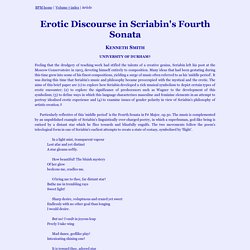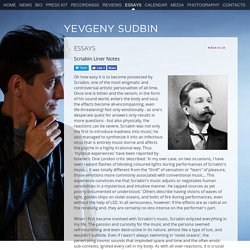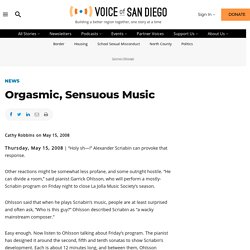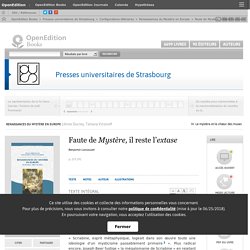

KENNETH SMITH 'Erotic Discourse in Scriabin's Fourth Sonata' BPM home | Volume 7 index | Article Feeling that the drudgery of teaching work had stifled the talents of a creative genius, Scriabin left his post at the Moscow Conservatoire in 1903, devoting himself entirely to composition.

Many ideas that had been gestating during this time grew into some of his finest compositions, yielding a surge of music often referred to as his 'middle period'. It was during this time that Scriabin's music and philosophy became preoccupied with the mystical and the erotic. The aims of this brief paper are (1) to explore how Scriabin developed a rich musical symbolism to depict certain types of erotic encounter; (2) to explore the significance of predecessors such as Wagner to the development of this symbolism; (3) to define ways in which this language characterises masculine and feminine elements in an attempt to portray idealised erotic experience and (4) to examine issues of gender polarity in view of Scriabin's philosophy of artistic creation.2 Example 1 5 H.
To Die in an Orgasm of Sound: Alexander Scriabin’s Symphonic Works. Imagine this, if you will: a gorgeous, Pre-Raphaelite temple (to no particular god) set amidst the sublime landscape of the Himalayas.

You arrive for the performance of a lifetime — namely, Alexander Scriabin’s magnum opus, Mysterium, a work for orchestra, chorus, soloists, dancers, odors, colors, and perhaps the earth itself, which is to last an entire week. At the conclusion of the work, the audience, along with the performers and the composer himself will die — ascending to the heavens in a state of cosmic bliss. In other words, the end of the world. A kitschy bit of 21st century avant-garde postmodern performance art?
Hardly…it was a work Scriabin conceived around 1909 and worked on feverishly until his death in 1915. Scriabin Liner Notes. Oh how easy it is to become possessed by Scriabin, one of the most enigmatic and controversial artistic personalities of all time.

Once one is bitten and the venom, in the form of his sound world, enters the body and soul, the effects become all-encompassing, even life-threatening! Not only emotionally - as one's desperate quest for answers only results in more questions - but also physically, the reactions can be severe. Scriabin was not only the first to introduce madness into music; he also managed to synthesize it into an infectious virus that is entirely music-borne and affects the psyche in a highly irrational way.
Scriabin Liner Notes. Aspen no. 2, item 2: Scriabin Again and Again. For so long now — in fact until very recently — Alexander Scriabin has lived under the haze of public amnesia.

Cloudily, he has existed in the memory as a series of half-remembered questions. Didn't he write a color symphony? Orgasmic, Sensuous Music - Voice of San Diego. Thursday, May 15, 2008 | “Holy sh—!”

Alexander Scriabin can provoke that response. Other reactions might be somewhat less profane, and some outright hostile. “He can divide a room,” said pianist Garrick Ohlsson, who will perform a mostly-Scriabin program on Friday night to close La Jolla Music Society’s season. When classical music is for adults only - Telegraph. Music can do dangerous things to us.

It can make us declare undying love, grab a sword and slaughter our foes, convert to a new vision of God. According to Homer’s Odyssey, it can even make us leap into the sea and drown. Odysseus has to sail past the Isle of the Sirens, and has been warned that the Sirens’ song will come upon him and his men unawares. It will drive them mad, and make them jump to their deaths.
Odysseus tempts fate by ordering his men to lash him to the masthead, so he can hear the music, and to stop up their own ears with wax. Where do we find music of such dangerous power nowadays? Thank goodness such things don’t go on at the Royal Festival Hall. That’s the thought suggested by Exstatica, a concert from the BBC Concert Orchestra. What piece gives you a musical orgasm? : classicalmusic. NPR Choice page. Alexander Scriabin. I agree Horowitz's recordings of Scriabin does him much justice but I also like Sofronitsky's and Richter's (Sorry to always bring his name up, but there's nothing I've heard from him that I don't like, not even his Bach).

Ashkenazy also excels here.I love how the titles of Scriabin's works have a very teenage mood swing to them: Pleasure and emoness. Examples of emoness (But maybe has to do with the color organ thingy): "Towards the flame", "Prometheus: The Poem of Fire" (even though the end seems to be the end of the emoness and the beginning of the ecstasy), "White Mass", and "Black Mass" (which he didn't give, but approved of.) Also markings in his music such as "poisonously" and "satanically. " The most orgasmic pieces ever written. Renaissances du Mystère en Europe - Faute de Mystère, il reste l’extase - Presses universitaires de Strasbourg. 1 Roberto Dikman, A.

Tout le monde n’a pas la chance de ressentir le frisson musical… Pourquoi. L’accès à toutes sortes de musiques s’est considérablement développé au cours du 20e siècle.

Pas pour rien que depuis une cinquantaine d’années, des chercheurs s’intéressent à ce que l’on appelle en français « le frisson musical ». Quand la musique procure des orgasmes. Pour une petite proportion des mélomanes, les émotions provoquées par la musique sont si intenses qu'elles peuvent être comparées à un orgasme.

Une étude scientifique s'est penchée sur les morceaux les plus susceptibles d'en procurer. Parmi eux, le Concerto pour piano n° 2 de Rachmaninov. Vous êtes installé dans le bus, dans votre canapé ou dans une salle de concert, le passage préféré de votre morceau favori est sur le point d'arriver. Vous sentez une vague d'émotion vous submerger, les larmes vous monter aux yeux, votre gorge se nouer et puis les frissons courir le long de votre colonne vertébrale ainsi que sur toute votre peau. Si vous avez déjà vécu une telle sensation physique, vous faites certainement partie de ces mélomanes capables de ressentir des "orgasmes de la peau " (skin orgasm), selon l'expression utilisée par une équipe de chercheurs de l'université Wesleyan dans le Connecticut. * Sur le même thème *
La musique provoque des orgasmes, c'est scientifique!